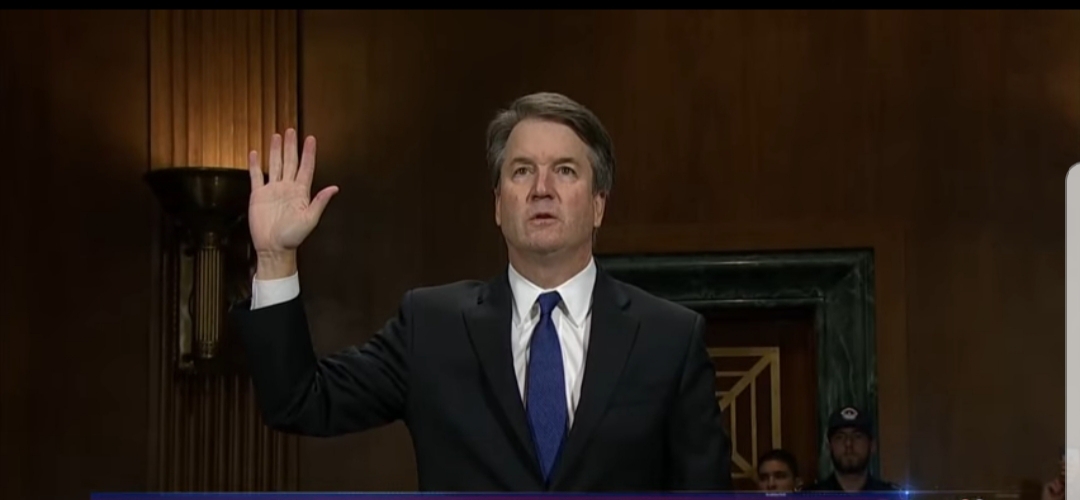
Cole Tamarri
Assistant Managing Editor
Eighty days after President Trump announced Judge Brett Kavanaugh of the Circuit Court of D.C, the eyes of the nation were on the Senate Judiciary Committee hearing on Sept. 27.
Dr. Christine Blasey Ford testified in front of the committee, detailing her account of an alleged attempted assault in July of 1982 between her and the Supreme Court nominee.
“I am here today not because I want to be. I am here because I believe it is my civic duty to tell you what happened to me while Brett Kavanaugh and I were in high school,” Ford read in her opening statement.
During her part of the hearing, Republicans elected to hire an Arizona sex crimes prosecutor, Rachel Mitchell to do the majority of their questioning.
Her report, released Monday, Oct. 1 and published in the Washington Post labeled the accusations leveled by Ford to be “even weaker than a he said, she said case.” The basis of Mitchell’s conclusions rested on “the lack of witness corroboration and witnesses refuting the claims,” per the memo.
“I think they [Republicans] should not have outsourced the questioning of Dr. Ford,” said ESU’s Political Science and Economics department chairman Dr. Samuel Quainoo. “That is their job and they lost the opportunity to showcase their ability to be diligent but fair and sensitive to women issues.”
Ford, visibly shaken, detailed before the committee how she remembered the “uproarious laughter at her expense,” citing how the memory was “seared into her.”
There were gaps in her recollections of the event and Senator Patrick Leahy pointed out that there was research from the U.S. Army Military Police School of Behavioral Sciences Education that explained why this was the case.
The lapses in memory according to the research, state that those incomplete memories are a subconscious response to trauma.
When Illinois Democrat Dick Durbin asked: “Dr. Ford, with what degree of certainty do you believe Brett Kavanaugh assaulted you?”
Ford responded without hesitation: “100 percent.”
During the entirety of the questioning from Democratic senators and the prosecutor Mitchell, Ford remained calm, collected and measured.
After four hours, Kavanaugh entered the hearing room. South Carolina Sen. Lindsey Graham set the tone for that segment of the hearing.
Graham concluded that the media coverage around the allegations had put Kavanaugh and his family through a great hardship.
“This is not a job interview. This is hell.” Graham emotionally stated to the committee, charging that Kavanaugh was as much a victim of the process as was Ford.
Republican Majority Whip John Cornyn from Texas went as far as to say “If we were in court [now], half of my colleagues would be in contempt of court.”
The opening statement from the former Bush administration appointee was emotionally charged.
“I deny the allegation immediately, unequivocally, and categorically,” Kavanaugh said.
The vitriol exuded from the former attorney was so strong, it was noteworthy for Quainoo.
“What concerned me was his demeanor during the hearing.” Quainoo said.
The exchange that raised eyebrows at media outlets across the country came when Minnesota senator Amy Klobuchar asked about Kavanaugh’s alleged drinking habits.
“Was there ever a time when you drank so much that you couldn’t remember what happened, or part of what happened the night before?” Klobuchar said.
Kavanaugh responded, “No, I — no. I remember what happened, and I think you’ve probably had beers, Senator, and —”
Klobuchar continued with the line of questioning, “So you’re saying there’s never been a case where you drank so much that you didn’t remember what happened the night before, or part of what happened.”
“It’s — you’re asking about, you know, blackout. I don’t know. Have you?” responded Kavanaugh with a flippant air.
“What’s important for me, for a Supreme Court justice is to have a certain temperament,” said Quainoo, commenting on the aforementioned exchange.
When asked whether or not the Republicans would be willing to sacrifice the long-term legitimacy of the United States Supreme Court for short-term leverage, Quainoo said,
“All bets are off,” Quanioo said on whether or not the Republicans would be willing to sacrificethe long-term legitimacy of the United States Supreme Court for short-term leverage “A year and a half ago if you had asked me, I would have said no.”
Twenty-four hours after Ford’s testimony on Sept. 28, the confirmation vote for Kavanaugh was slated to take place. Democrat members of the committee began to exit during Chairman Charles Grassley’s opening remarks in protest of the potential upcoming vote.
After three hours of deliberation and a compromise from retiring Arizona senator Jeff Flake, that he would allow the vote to go to the Senate floor provided a week-long FBI investigation into Ford’s allegations, day five of the Kavanaugh hearing concluded.
As of Oct 2., according to Politico, the FBI investigations are believed to wrap up before Friday, Oct. 5, with findings released to all 100 members of the Senate, with a vote shortly thereafter.
Email Cole at
ctamarri@live.esu.edu

